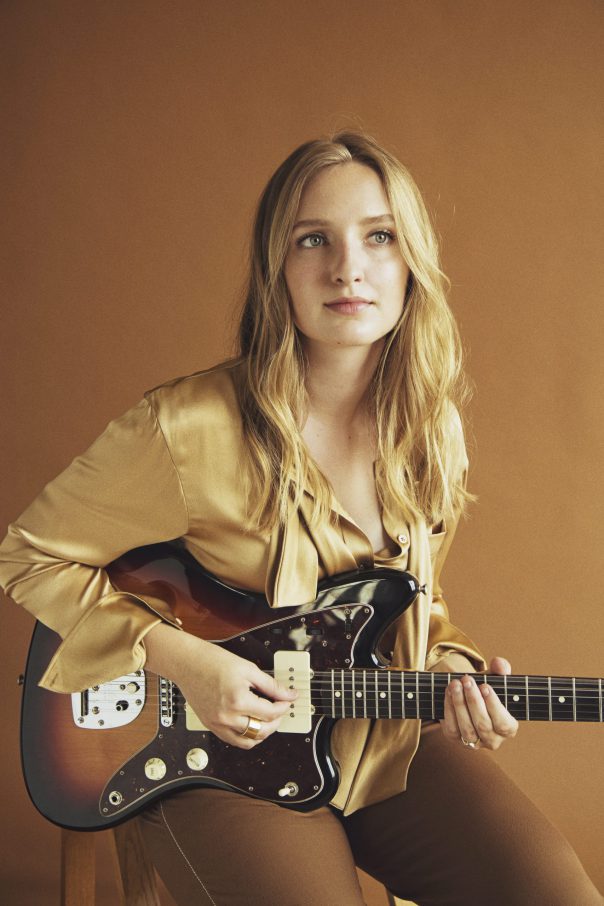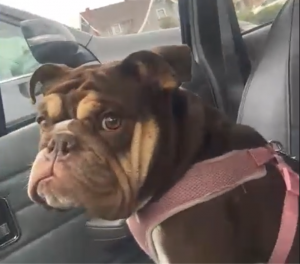Interview: Madison Cunningham looks for hope and promise in loss

Madison Cunningham, courtesy.
Madison Cunningham doesn’t usually do her interviews from her car in a grocery store parking lot. It was the coffee, or lack of it, that led her and her beautiful bulldog mix Gus to this point. She’d slept through her alarm, then realized she had no coffee and was halfway to the shop before she realized she had a call with a reporter on this morning.
Madison Cunningham
SG Goodman
8 p.m., Monday, Oct. 4
The Independent
Tickets: $20.
You can’t fault the Orange County singer-songwriter for needing some help keeping track of her schedule now that concerts are resuming and her would-be breakthrough 2020—festivals, a Mandy Moore tour, opening for Harry Styles at Madison Square Garden—is ready to turn into a breakthrough 2021 and ’22.
“My goals; I feel like they’ve gotten to be just a little bit more ambitious,” Cunningham said, Gus next to her in her car. “My expectations are at a different place now, and then [I’m] also in this place of ‘I only have one life and I’m living now. Let’s do it now; let’s not hold any punches back.’ … Which is healthy, because you have to have your foot on the gas, but you have to also be OK with the outcome, or if it doesn’t go exactly according to plan.”
Those Madison Square Garden shows with Styles, who had discovered her music and messaged her out of the blue, are back on for next month. Rather than a tour opening for another artist, she’s headlining her own now. Besides Styles, she’s got supporters in the likes of John Mayer and Sara Bareilles.
Her 2019 album, Who Are You Now, was nominated for the Best Americana Album in the 62nd Annual Grammy Awards. Madison Cunningham’s music isn’t even straight Americana, though. There are elements of rock and even jazz in there. Just take a listen to 2019’s “Song In My Head” or “Pin It Down.”
“It could be a frustrating thing when people just want to know how you see yourself, or what music you think you’re bringing to the table,” she said. “I don’t necessarily know what [Americana] even is. … I usually just play things that I like or that move me. It doesn’t always stem from the same place, the same genre, the same field, or whatever. I try to keep it very, very open for interpretation in that way.”
Cunningham has played guitar since she was 7, and by age 12, she and her siblings were performing in their father’s church. But she didn’t grow up listening to much music at home and didn’t discover its pillars until graduating from high school. She liked Switchfoot (she appeared on Jon Foreman’s solo album earlier this year), but other than that, she didn’t even listen to much gospel music at home. No DC Talk, Toby Mac or Newsboys.
“I didn’t have an understanding of the Beatles or the Rolling Stones or any of the bands that were making waves even decades before I was a kid,” she said. “I just came into music in a way that was … more instinctual; less visual. I didn’t have all these big, towering examples of people that I was trying to be like. I was mad about that for a minute when I found out who the Beatles were and that my parents didn’t show them to me. But as I look back on it, I’ve realized I got to make music from a very unencumbered, unassuming place. I was inventing things that might have already been invented but I didn’t know that. It was exciting.”
By high school, she was listening to the likes of Aretha Franklin, Donny Hathaway and Roberta Flack, based on the recommendations of people at church.
Then, on the day she graduated, her producer Tyler Chester, with whom she was working on her debut (a 2014 gospel LP called Authenticity), gifted her the Beatles’ Rubber Soul and Abbey Road.
She compares playing them in her CD player for the first time to a mind explosion. She realized that she’d heard those songs before but had idea who’d recorded them. She was soon listening to Joni Mitchell and Bob Dylan, Norah Jones and B.B. King. Cunningham said she often jokes that had she known more about those artists any earlier in her life, she might have taken them for granted.
Madison Cunningham learned to not take 2020 for granted, either, after the year that began with so much promise, stalled out and then led to family tragedy with the death of her grandmother, Rachel Cunningham, to a sudden stroke.
“I started 2020 off kind of laughing about everything, just because it just didn’t feel real, and I thought, ‘Oh, this will be over in three weeks and then we’ll get back to normal,’” she said. “And then it was evident that that wasn’t the case. As time went on, the joke kept getting less funny.”
Reality and dread began to set in. She questioned how musicians’ careers could survive the pandemic; how artists themselves could survive; how the country could break out of such an unhealthy place. There was much more turmoil than COVID-19 in the summer of 2020. Then her grandmother passed away.
“It focused my attention and priorities, and I started to posture my heart in a place of not complaining towards the things that weren’t happening, but celebrating the life that was still existing,” she said. “I saw the fragility of life before my eyes in losing her, and suddenly all the things that I was kind of complaining about felt so silly and small. Even though they were valid. It’s part of life. You’re losing a part of the way that you function and the things that you love about life. That’s a death in itself.”
The realization that humans were made to withstand and outlive tragedy refocused Cunningham’s outlook and music—first with four covers on EP Wednesday in late 2020. She covered The Beatles’ “In My Life,” as well as songs by Radiohead, Tom Waits and John Mayer.

Gus the bulldog mix.
“We were in the middle of the world falling apart, so I decided to pick songs that felt like they were sensitive to the times,” she said.
Next, early this year, she wrote single “Broken Harvest” for NPR Morning Edition’s Song Project. The song is much more hopeful than the name implies and is a way for Cunningham to be thankful for the present.
“In the chorus it says, ‘What do I know?/ What do I own that will not fade away?’ And for whatever reason, that reality started to be very comforting to me,” she said. “When my grandma died, my grandpa said to me, ‘It’s just a part of life.’ Obviously, that was a really painful thing for him to say, but it really was jarring to my perspective. … We all know that death or loss of some sort is headed towards us, but we don’t know when. We can’t really prepare for it, and we just have to embrace it. We have no other choice.”
Those same lessons have informed her next album, which she’s already written and is now in the middle of recording. She hopes to have it done by December and out by the middle of 2022. Much of the forthcoming album is about her losing part of herself, finding solace in friendships and putting herself back together. She tried not to write specifically about the pandemic but about her own specific experience, including about losing her grandmother.
“She’s a big part of the story. But then, as a result from being locked down and isolated, I felt like I started to lose myself a little bit and started to unravel in certain ways that were healthy to face,” she said. “It would have happened either way—pandemic or not— but the pandemic just hastened the process.”
Follow editor Roman Gokhman at Twitter.com/RomiTheWriter.
